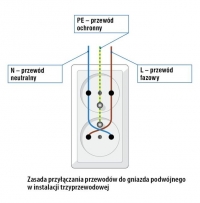FAQ
TL;DR: A 30 mA RCD should trip at its rated residual current; “RCCBs shall trip at IΔn” per IEC 61008. If your fridge only trips when the plug is one way, fix the leakage fault—don’t swap socket polarity. [Schneider Electric FAQ, 2025]
Why it matters: This FAQ helps homeowners and renters diagnose a fridge that trips a residual-current device (RCD/GFCI) depending on plug orientation—safely and correctly.
Quick Facts
- Personal-shock protection RCDs commonly use IΔn = 30 mA; devices must trip at IΔn within specified time per IEC 61008. [Schneider Electric FAQ, 2025]
- Schuko/Type F sockets are unpolarised; line and neutral are reversible by design. [Schuko — Wikipedia]
- Insulation resistance for ≤500 V circuits: test at 500 V DC; minimum acceptable is 1 MΩ (equipment disconnected). [IEC 60364-6:2016]
- To avoid nuisance trips, cumulative leakage downstream of an RCD should be ≤30% of IΔn (≈9 mA for a 30 mA RCD). [IET Wiring Matters, 2021]
Why does my fridge trip the RCD only when phase is on the “standard” side?
Plug orientation should not matter on Schuko. A trip in one orientation points to appliance leakage or damaged insulation that becomes evident with that wiring. Swapping live and neutral only masks the fault briefly. As one expert put it, the appliance must work regardless of socket polarity; find and fix the leakage. [Elektroda, kkas12, post #16717264]
Is it safe to keep using the phase-right socket where it doesn’t trip?
No. Continuing use risks shock if the fault worsens and the protective earth fails. Do not modify socket polarity or rely on a “works this way” orientation. Have the refrigerator inspected and repaired; removing the fault is the correct fix. [Elektroda, kkas12, post #16717257]
What should I check first on the refrigerator?
Unplug the unit. Inspect the power cord and plug for crush damage, cuts, or moisture. Cord faults often create earth leakage that trips an RCD. If damage is visible, replace the cord or have a technician do it. If not, proceed to insulation and leakage testing. [Elektroda, jack63, post #16717300]
How do I test insulation safely on this circuit?
- Disconnect power and unplug all appliances on the circuit.
- Using a calibrated megohmmeter (Fluke/Megger), test L+N tied together to PE at 500 V DC.
- Pass if ≥1 MΩ; if lower, isolate sections or the fridge to locate the fault and service it.
“≥1 MΩ at 500 V DC” follows IEC 60364-6. [IEC 60364-6:2016]
What is an RCD/GFCI and how does it work?
An RCD (aka RCCB; GFCI in North America) compares live and neutral currents and trips when their difference exceeds IΔn (often 30 mA). IEC 61008 requires tripping at IΔn within a specified time. This helps prevent shock and limits damage from faults. “RCCB shall trip at IΔn.” [Schneider Electric FAQ, 2025]
Can cumulative leakage on the circuit cause nuisance tripping?
Yes. Multiple devices’ normal leakage adds up. Guidance limits steady leakage to ≤30% of IΔn to reduce unwanted trips—about 9 mA on a 30 mA RCD. If your fridge shares a heavily loaded RCD, move loads to another RCD or use RCBOs. [IET Wiring Matters, 2021]
Does a Schuko socket have a standard ‘phase-left’ or ‘phase-right’ layout?
No. Schuko (CEE 7/3 and 7/4) is unpolarised and symmetrical. You can insert the plug either way; devices must remain safe regardless of orientation. Therefore, orientation-dependent tripping indicates a problem elsewhere. [Schuko — Wikipedia]
Could internal EMI filters make the fridge sensitive to plug orientation?
Some filters reference neutral, but appliances with Schuko plugs are designed to operate safely in either polarity. Orientation-dependent tripping signals leakage or insulation damage that needs repair, not rewiring. “Plug-in devices must work regardless of polarity.” [Elektroda, kkas12, post #16717264]
What’s the correct fix for this problem?
Locate and repair the leakage fault. Typical culprits include damaged cords, damp defrost heaters, or compromised compressor wiring. Do not defeat or bypass the RCD. “Find this place and do not modify the socket.” Engage a qualified service technician. [Elektroda, kkas12, post #16717246]
Could reversed live/neutral in the outlet be the cause?
With Schuko, line and neutral reversal is inherent and acceptable. More critical is correct earthing and RCD/MCB wiring. Have a qualified electrician verify the fixed wiring and protective devices if in doubt. [ac - Schuko plug wiring — EE StackExchange]
What additional tests should a technician perform?
Request: insulation resistance (L/N–PE), earth continuity, and differential leakage current under operation. Also test RCD performance with an RCD tester at 0.5×, 1×, and 5× IΔn to confirm trip behavior. Document results for service records. [Schneider Electric FAQ, 2025]
Can DC leakage from the fridge ‘blind’ an AC-type RCD?
Yes. Residual DC components can desensitize Type AC RCDs, causing missed trips or nuisance behavior. If electronics are involved, consider using a Type A RCD where required and verify leakage characteristics. [IET Wiring Matters, 2021]
What is an insulation tester (megohmmeter)?
It applies a controlled DC voltage (commonly 500 V) and measures resistance between conductors and earth to detect breakdown or moisture paths. For 230/400 V circuits, values should be ≥1 MΩ with equipment disconnected, per IEC 60364-6. [IEC 60364-6:2016]
Are RCDs and GFCIs the same thing?
They perform the same function; “RCD/RCCB” are IEC terms used in Europe, while “GFCI” is used in the U.S. Operation is identical: detect imbalance and trip quickly to reduce shock risk. [Residual-current device — Wikipedia]
Give me one statistic on RCD operation I can use when calling a tech.
For a 30 mA device, guidance caps continuous downstream leakage at about 9 mA (30% of IΔn) to avoid unwanted trips. [IET Wiring Matters, 2021]
What’s the worst-case risk if I keep flipping the plug until it works?
You might temporarily stop tripping while leakage increases, leaving metal parts live if the protective earth fails. That raises shock and fire risk. Fix the fault instead of relying on orientation. [Elektroda, kkas12, post #16717257]



